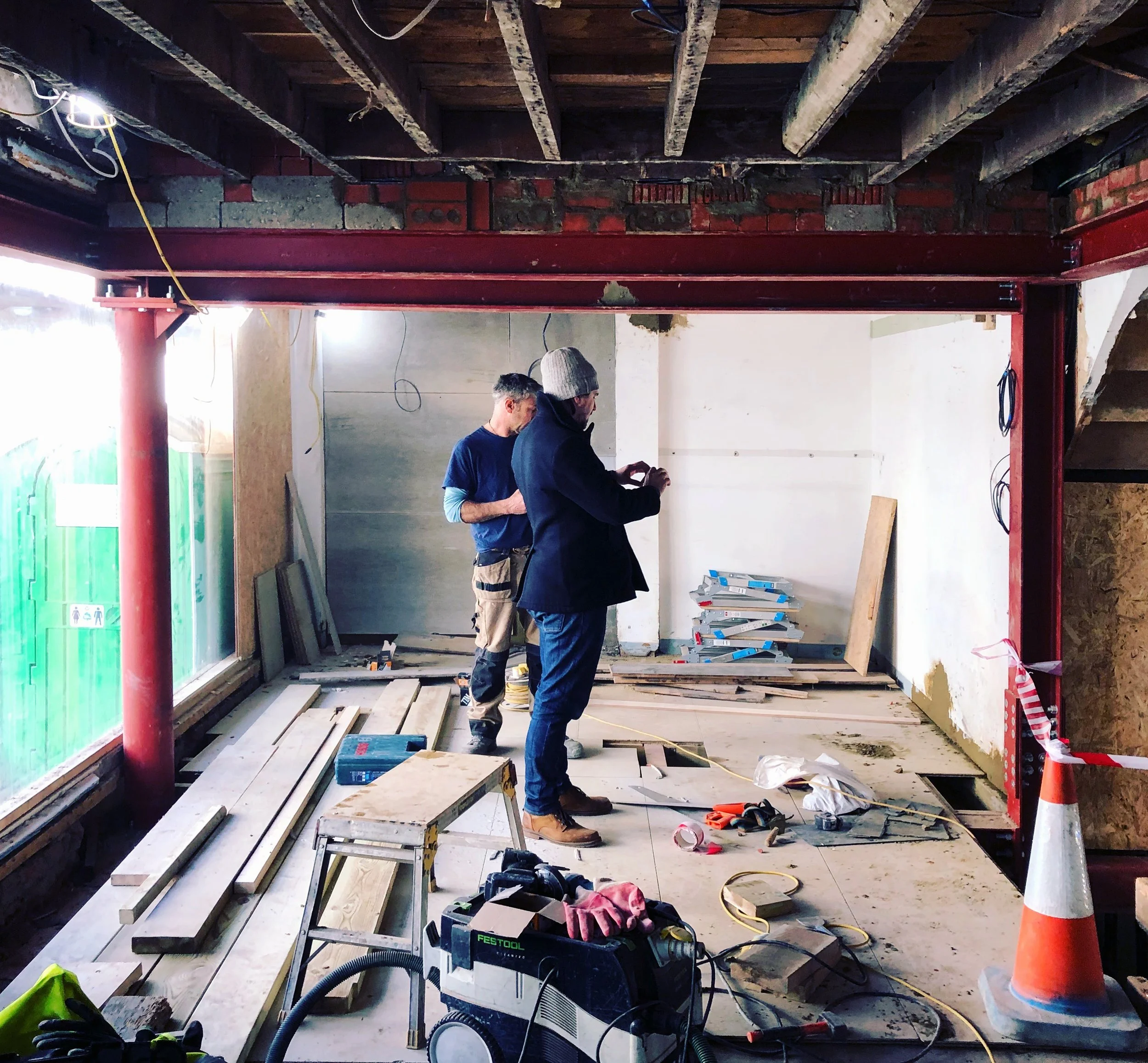Specializing in architecture and design for commercial, hospitality & shop projects.
Is being an architect a good career? Truth, money & job seeking
Is a career in architecture the right path for you? This is a complex question with no simple answer. We are asked by many studying the profession of architecture; how do I become an architect, so we wrote this article to offer guidance. Many factors come into play when deciding if pursuing an architecture career is a good fit, including your passion for design, your aptitude for problem-solving, and your financial expectations, as well as your desired work-life balance. This article explores the realities of the field of architecture, providing insights into the architect’s salary, job prospects, and the overall job market to help you make an informed decision.
What Does an Architect Do?
Architects are more than just designers of buildings; they are visionaries who shape the built environment and often collaborate with interior designers. The role of an architect encompasses a wide range of responsibilities, from initial concept and planning to detailed design and project development. Architects must possess a comprehensive understanding of building codes, zoning regulations, and sustainable design principles. They collaborate with clients, engineers, and contractors to bring their ideas to life, ensuring that every project is both aesthetically pleasing and structurally sound. Alter Architects, for example, specialises in creating unique, design-led buildings across various sectors, focusing on harmony between people, place, and planet. To be an architect is to be a master of all these fields.
Abilities Required to Become an Architect
Becoming an architect requires a diverse skillset that extends beyond artistic talent, including knowledge of interior design. Critical thinking, problem-solving, and strong communication skills are essential. Architects must be adept at using computer-aided design (CAD) software and building information modeling (BIM) tools to create detailed plans and models. They also need to possess a solid understanding of mathematics, physics, and engineering principles to ensure the structural integrity of their designs. Demand for skilled architects is always high, so honing these skills will make you a competitive candidate in the job market and allow you to specialise in specific types of architectural work.
Education and Training Needed
The path to becoming a licensed architect typically involves a significant investment in education and training, often through a program in architecture. Aspiring architects undergo a series of crucial steps, including:
Completing a professional degree in architecture from an accredited architecture school.
Gaining a period of practical work experience under the supervision of licensed architects.
Passing the Architect Registration Examination ARB once the required work experience is gained.
This rigorous process ensures that only qualified individuals are granted the title of "architect" and are able to practice architecture independently. It is a lengthy process, but ensures the ongoing integrity of the architecture industry, making it a rewarding career choice for many.
Salary Expectations for Architects
Average Salary of an Architect
The architect’s salary is a significant consideration when pursuing an architecture career. The average wage for architects can vary widely based on location, experience, and specialization. While it's difficult to provide an exact figure, data from the Bureau of Labor Statistics offer valuable insights. Many architects find the financial rewards commensurate with the challenges and responsibilities of the job. However, entry-level architects should expect a lower salary compared to licensed architects with years of experience. The ability to specialise can significantly improve the architect’s salary. for purpose.
Salary by Experience Level
The typical career path of an architect sees salary increase substantially with experience. Entry-level positions naturally command a lower salary, but as architecture students gain work experience and become architects, their earning potential grows. Architects with licenses and a proven track record of successful projects can negotiate higher salaries. Further, architects must also consider additional certifications, such as LEED accreditation for sustainable design, to potentially enhance their salary prospects. Demand for skilled architects in the industry ensures that experienced professionals are well-compensated.
Several factors beyond experience can impact an architect's salary. Location plays a significant role, and specialization can lead to a higher salary. Location plays a significant role, with architects in major metropolitan areas often earning more than those in smaller towns, where job opportunities may be fewer. The type of firm or organization also matters; large architecture and engineering firms may offer higher salaries and great benefits compared to smaller practices. Moreover, the ability to specialise in a niche area, such as sustainable design or healthcare architecture, can make an architect more valuable, leading to increased demand for architects with specific expertise, and a higher salary.
Factors Influencing Architect Salaries
Job Outlook for Architects
The job outlook for architects remains promising, though it's subject to economic fluctuations and construction trends, with openings for architects projected to grow in the coming years. The Bureau of Labor Statistics projects steady growth in the field of architecture. As populations grow and urban areas expand, the need for architects to design and plan infrastructure will continue to rise. Aspiring architects can take encouragement from this positive trend, knowing that becoming a licensed architect will offer long-term career stability. To become an architect is a goal that offers solid prospects.
Projected Growth in the Field
Entry-Level Opportunities
While becoming a licensed architect requires time and dedication, entry-level opportunities provide a crucial stepping stone for architecture students. These positions, such as internships and junior designer roles, offer invaluable work experience and exposure to the practical aspects of the profession. The goal in these positions is to hone essential skills and learn building codes, as well as establish a professional network. For those pursuing an architecture career, securing an entry-level role is a vital step in launching their career path and learning what architects must deal with in practice.
Work Experience and Career Advancement
Work experience is paramount for career advancement in the architecture industry. As architecture students accumulate years of experience, they can take on more complex projects, assume leadership roles, and specialise in areas that align with their passions. Obtaining a license is a significant milestone, allowing architects to practice independently and take on greater responsibility. The ability to demonstrate a strong portfolio of successful projects and a commitment to sustainable design are key factors in advancing one's career path and becoming a sought-after professional, which in turn increases demand for architects.
To become a licensed architect, several important steps must be completed. These include:
Obtaining a professional degree from an accredited architecture school.
Gaining practical work experience through internships.
Successfully completing the Architect Registration Examination.
These steps are crucial for becoming a licensed architect and can lead to a fulfilling and rewarding career.
Steps to Pursue a Career in Architecture
How to Become an Architect
Internships and Practical Experience
Internships and practical work experience are vital components of architectural education and training, providing students with insights into the career choice they are making. Architecture students gain invaluable hands-on experience by working under the supervision of licensed architects, which can lead to job openings for architects in the future. These experiences provide exposure to real-world projects, building codes, and construction processes. Internships also help architecture students develop essential skills, such as communication, problem-solving, and collaboration. Many architects attribute their success to the practical experience they gained during their internships. This work experience is key to progressing on the architecture career path and enhancing understanding of what architects must deal with, including job opportunities in various sectors.
Is Architecture the Right Career for You?
Choosing a career in architecture has both advantages and disadvantages. There are compelling reasons to consider this field, including:
The opportunity to express creativity and shape the built environment.
The potential for professional fulfillment as a licensed architect.
However, the career path can be demanding, with long hours and tight deadlines. The job market can be competitive, and the architect's salary may not always reflect the level of education and effort required, though openings for architects are projected to grow. Ultimately, the decision of whether or not to become an architect depends on individual priorities and aspirations.
Pros and Cons of Being an Architect
Final Thoughts on Career Satisfaction
Career satisfaction depends on a genuine love for architecture and a willingness to work hard. The decision to pursue a career in architecture is a personal one that should be based on careful consideration of one’s passions, skills, and financial expectations. While becoming an architect can be challenging, it can also be incredibly rewarding for those who are passionate about design and the built environment. Many architects find great satisfaction in creating spaces that enhance people’s lives and contribute to the well-being of communities. If you have a genuine love for architecture and a willingness to work hard, a career in architecture may be the right path for you.



